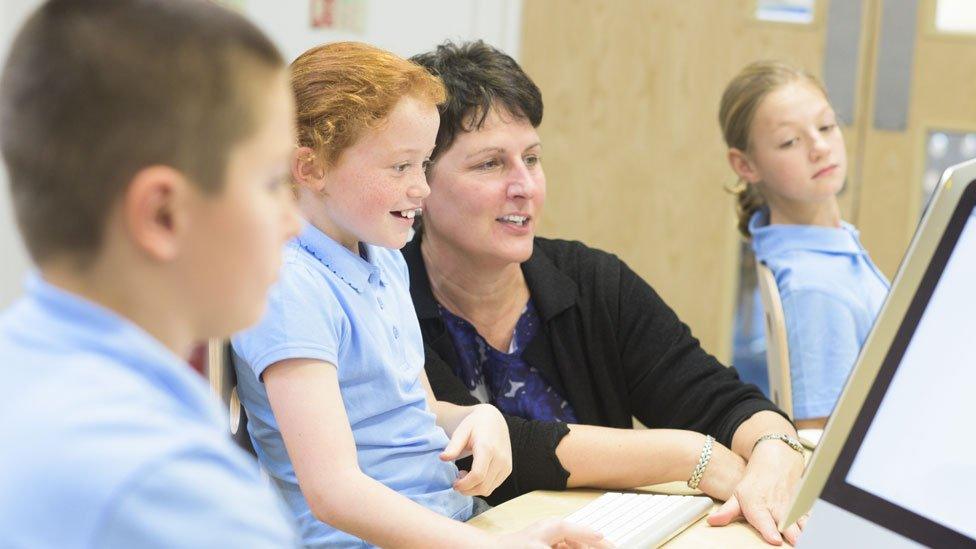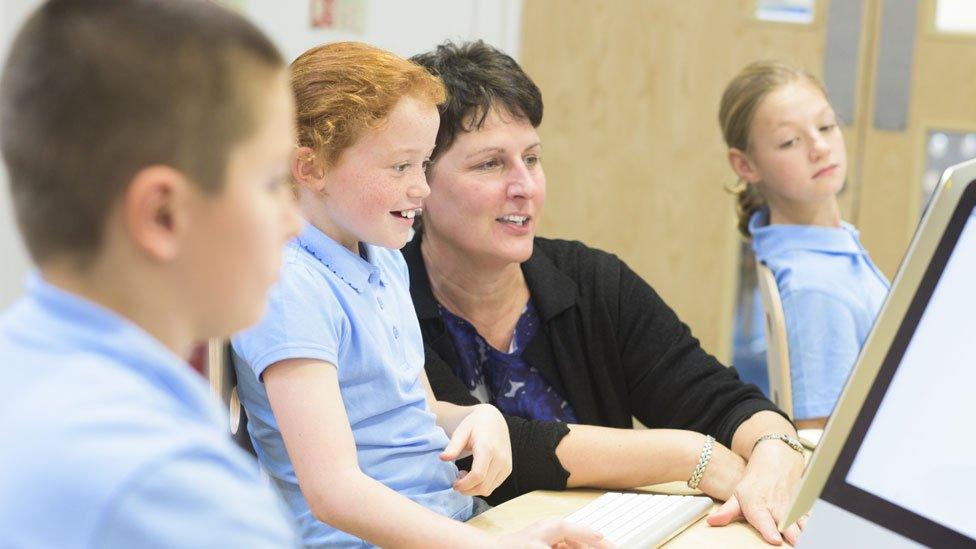The pendulum swings back on school tests
- Published

There have been long-running arguments about how much testing is right for primary schools
If news stories could have a soundtrack, then this scrapping of tests in the early years of primary school would have the creaking sound of a pendulum slowly swinging back.
The Department for Education is proposing that national curriculum tests taken by seven-year-olds in England could be ditched.
Instead there would be an assessment of five-year-olds by a teacher - a so-called "baseline test" - which would be used as a starting point for measuring progress through primary school.
It represents a step backwards from more and more testing - a shift in attitude as much as policy.
And it raises again the thorny question of what kind of tests young children should face in primary school.
Are such tests a helpful indicator for identifying pupils' needs? Or are they an unnecessary pressure - a case of too much, too young? And are such tests going to mean a paper mountain of extra bureaucracy for teachers, hindering rather than helping learning?
'Hope over experience'
The teachers' unions have broadly given their support to the government's announcement to row back on the tests for seven year olds in reading, writing, maths and science.
But the National Union of Teachers still says the idea of a baseline test for four or five-year-olds remains a "triumph of hope over experience".
The teachers' union questions whether this can ever be a sufficiently reliable test to be used as a fixed point against which to measure all the following years of a child's progress.
But the counter-argument to this is that you have to start somewhere.
If schools are to be held to account for how much progress children have made by the age of 11 - then it has to be measured against a starting point.
And isn't the natural starting point in the first year?
There is also a strong argument that it is the low achievers and the disadvantaged who will be most in need of the extra help that a test might identify.
And at the last general election, all three main political parties were sympathetic to the principle of baseline testing.
But the announcement on testing also raises another great back and forth of the education pendulum. How much data is too much?
Parents' evenings, with spreadsheets and targets, can feel like a chat with the accountants.
And for the schools themselves, the accumulation and analysis of data has become a major part of their working lives.
It is make or break too, because Ofsted inspectors will also be using the same crowded panel of charts and indicators, tracking progress on computer screens like mission control following a space probe or some trader overseeing the foreign exchange markets.
Focusing attention
This has often prompted the accusation that an over-emphasis on testing undermines those cultural and mind-expanding things that can't be tested - like putting on plays, debating ideas and playing sport.
And there is an argument that tests shape all around them. Once a test is set, with rewards and penalties, then that metric becomes the priority that overrides everything else. It isn't so much the testing, as the use to which it is put and the consequences built upon it.
But Sats tests have been part of primary school life in England for more than 25 years - and there is little chance of them completely disappearing.
Supporters of testing will point to the importance of holding schools to account for all their pupils.
Tests have been seen as a way of focusing attention. It means that schools that are failing their pupils can be identified and improved.
If there were no tests and targets, wouldn't it be easier for an underachieving youngster to drift through school without recognition of the support and intervention they might need?
England's relative success in education rankings compared with Wales has been claimed as being linked to the absence of Sats tests and league tables in Wales.
But the battle over testing will continue - often as much about perception as anything else.
The international TIMSS tests - the Trends in International Mathematics and Science Study - which have been measuring international education standards since the 1990s, recently examined the almost universally-accepted truth that testing had becoming increasingly frequent and pupils were under more scrutiny and pressure.
Except, when this was investigated across a wide range of countries, it was broadly speaking untrue. Testing was not particularly more common than in the 1990s.
The Sats tests in England were once at the ages of seven, 11 and 14 - with the test for 14 year olds scrapped when Ed Balls was education secretary.
And in striking out the test for seven-year-olds, the education secretary has pushed the pendulum a little further away from testing.
- Published30 March 2017

- Published27 January 2017
